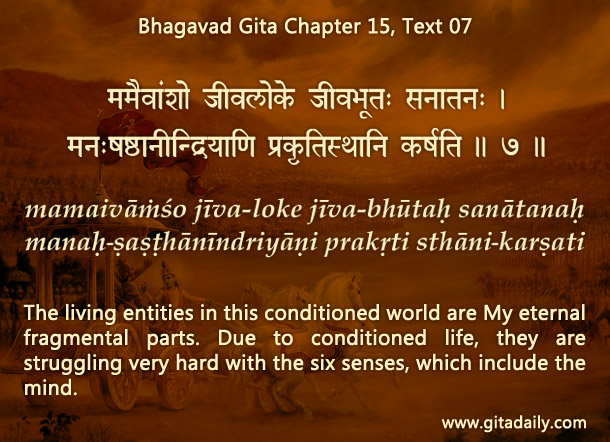“Who we are” is the first philosophical message of the Bhagavad-gita. It explains that we are at our core eternal souls. Understanding this can free us from worldly cravings: If I am not a material creature, then material things can’t make me happy.
However, some people, on understanding that they are indestructible souls, start equating the soul with the all-pervading spiritual Absolute Truth – they start equating themselves with God. But we are not God – we are God’s. We are eternal parts of Krishna, as is unambiguously declared in the Bhagavad-gita (15.07). The same verse points to the cause of our struggles in material existence: captivation by the mind and the senses, which delude us with fantasies of worldly pleasures. To become liberated, we need to free ourselves from such material captivation and situate ourselves in spiritual consciousness. Because our position as Krishna’s parts is eternal, liberation means becoming situated in a loving relationship with Krishna, just as a part may become harmonized with the whole.
Unfortunately, when spiritualists think themselves to be God, though their spiritual self-conception may motivate them to liberate themselves of lust, greed and anger, they end up captivated by pride. After all, for the infinitesimal part to equate itself with the infinite whole is the height of presumptuousness. Moreover, such spiritualists deprive themselves of the higher happiness that comes from meditating on God as the all-attractive Lord of the heart. Because they are bereft of this happiness, they make rejection of material allurements unnecessarily difficult.
Thankfully, if we study the Gita submissively, we can get complete spiritual knowledge: knowledge of who we are and of whose we are. When our spiritual journey is based on proper understanding of both, we can, being empowered by Krishna’s mercy and bhakti’s higher taste, march swiftly towards life’s supreme liberation.
Explanation of article:
https://www.youtube.com/watch?v=I7f5AD6fnOY


Leave A Comment